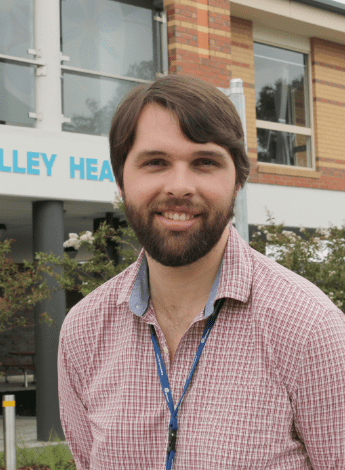
Teaching physio students about mental ill health

PAT COSH TRUST University of Melbourne physiotherapy educators Ryan McGrath, Karen Donald, Kim Allison and Tandy Hastings-Ison have teamed up with mental health researcher Michelle Lamblin to develop a program for students about mental health.
Physiotherapists frequently encounter clients experiencing mental ill health, including depression, anxiety and generalised psychological distress.
However, especially early on in their careers, they may feel poorly equipped to understand the impact of mental ill health on their patients.
‘In my own clinical experience working in many different areas, particularly in rural health settings, I’ve encountered a lot of clients who are experiencing high levels of distress,’ says physiotherapist and researcher Ryan McGrath APAM, who is based at the University of Melbourne’s Department of Rural Health in Shepparton.
‘My research has shown that there isn’t a lot of support or training given to physios to help them navigate those complex clinical situations.
‘It’s not only about working with someone else who’s experiencing distress but about not having the training provided to them to manage their own emotions, both within that context and more broadly.’
Ryan and his colleagues—Associate Professor Karen Donald, the course coordinator for the University of Melbourne’s Doctor of Physiotherapy program; senior lecturers Dr Kim Allison and Dr Tandy Hastings-Ison; and Dr Michelle Lamblin, senior research fellow at The University of Melbourne and program manager for the suicide prevention research team at Orygen, the National Centre of Excellence in Youth Mental Health—have been awarded a Pat Cosh Trust Grant to develop a mental health learning package for physiotherapy students that will support mental health literacy and raise awareness of mental health conditions commonly encountered in practice.

Ryan McGrath has been awarded a Pat Cosh Trust grant to develop a training module to teach physiotherapy students about mental ill-health.
‘There’s still a lot of stigma and misconceptions about mental health, even among medical professionals and allied health professionals, and misunderstandings about the way different people may present with mental ill health,’ Michelle says.
A co-design approach involving students currently enrolled in the physiotherapy program will be used to develop and evaluate a blended learning package to support mental ill health awareness and literacy, which will be incorporated into the first year of the Doctor of Physiotherapy program.
An initial workshop will focus on student expectations and needs for a mental health learning package and the resulting design and content will be refined during subsequent workshops.
The module, which is likely to incorporate both online and in- person components, will then be developed and evaluated by first-year physiotherapy students and ultimately added to the first- year curriculum at the university.
‘An interesting aspect of this project is that it will actually be integrated very early in their program,’ Ryan says.
He adds that introducing the concepts of mental ill health in first year allows the students to be safely supported through their placements and prepared for when they graduate.
Michelle notes that equipping people with the skills to ask questions about mental health can open doors to conversations.
‘There are no negatives to upskilling more people in mental health awareness or suicide prevention.
‘I find it interesting that there’s still a real separation of mental and physical health when they should be going hand in hand,’ she says.
The team hopes to hold the workshops later this year, once ethics approval has been obtained, with the aim of running a pilot version of the course in the second semester of 2025.
‘We think it could be quite challenging content for first-semester first-year students so it’s likely to sit at the beginning of the second semester, when they’re really starting to think beyond basic assessment and more about the patient as a whole person,’ says Karen.
Once the course is completed, the team plans to make it widely available for use by other universities as part of their physiotherapy curriculum, for clinical supervisors supporting students on placement and for professional development.
© Copyright 2024 by Australian Physiotherapy Association. All rights reserved.





